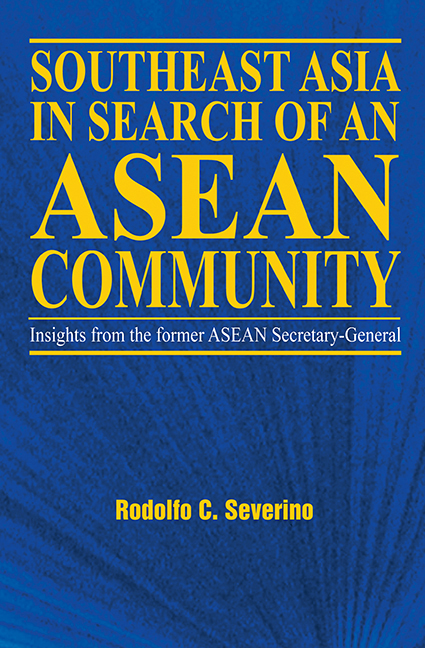Book contents
- Frontmatter
- Contents
- Foreword
- Introduction
- About the Author
- Acknowledgements
- Glossary
- 1 The “ASEAN Way”: Its Nature and Origins
- 2 Who Belongs in ASEAN? The Question of Membership
- 3 The Issue of Non-Interference
- 4 Regional Security: The ASEAN Role
- 5 Integrating the Regional Economy
- 6 ASEAN and the World
- 7 The ASEAN Community: Is It for Real?
- 8 What Kind of Future for ASEAN?
- Appendices
- Interviews
- Index
Foreword
Published online by Cambridge University Press: 21 October 2015
- Frontmatter
- Contents
- Foreword
- Introduction
- About the Author
- Acknowledgements
- Glossary
- 1 The “ASEAN Way”: Its Nature and Origins
- 2 Who Belongs in ASEAN? The Question of Membership
- 3 The Issue of Non-Interference
- 4 Regional Security: The ASEAN Role
- 5 Integrating the Regional Economy
- 6 ASEAN and the World
- 7 The ASEAN Community: Is It for Real?
- 8 What Kind of Future for ASEAN?
- Appendices
- Interviews
- Index
Summary
I have great pleasure in writing this Foreword.
First, I am an old friend and admirer of the author, Rodolfo Severino. I admire the good work he did as ASEAN Secretary-General. I admire his accomplishments as a skilful diplomat of his country's foreign service. I admire him as a gentleman, a peace-maker and a man of goodwill. Recently, we had the pleasure of working together in the ASEAN–China Group of Eminent Persons. Rod, as we affectionately call him, Jusuf Wanandi of Indonesia and I were able to collaborate closely in the Group and to make a modest contribution to its work.
Second, this important book is being published at an important moment in the life of ASEAN. After thirty-eight successful years, the Association has recently established a Group of Eminent Persons (EPG) to make recommendations for an ASEAN Charter. The members of the EPG will find many thoughtful essays in this book on issues which are on their agenda, for example, should all ASEAN decisions continue to be made by consensus, should Timor-Leste be admitted into ASEAN, how to bridge the gap between the older and more developed members and the newer and less developed ones, should the principle of non-interference be watered down, should ASEAN become a more formal, more legal, more rule-based organization, how to accelerate the pace, breadth and depth of ASEAN integration?
Third, this book is also relevant to the increasingly important role which ASEAN plays in bringing the region together and in bringing the region and its external stakeholders together. The major powers of the region, China, India and Japan do not enjoy a high comfort level with one another. For this reason, it is not possible for any one of them to launch an initiative without arousing the suspicion of the others. ASEAN is not allied to any and is acceptable to all of them. ASEAN is also acceptable to the external stakeholders, such as the United States, EU, Australia, Canada and New Zealand. This is why ASEAN finds itself in the driver's seat of the ASEAN Regional Forum and of the newly inaugurated East Asia Summit. It is a great responsibility to be the driver, the architect of the evolving regional order. Rod Severino has several constructive ideas on how ASEAN can live up to this responsibility in Chapters 6 and 7 of the book.
- Type
- Chapter
- Information
- Southeast Asia in Search of an ASEAN Community , pp. ix - xPublisher: ISEAS–Yusof Ishak InstitutePrint publication year: 2006

